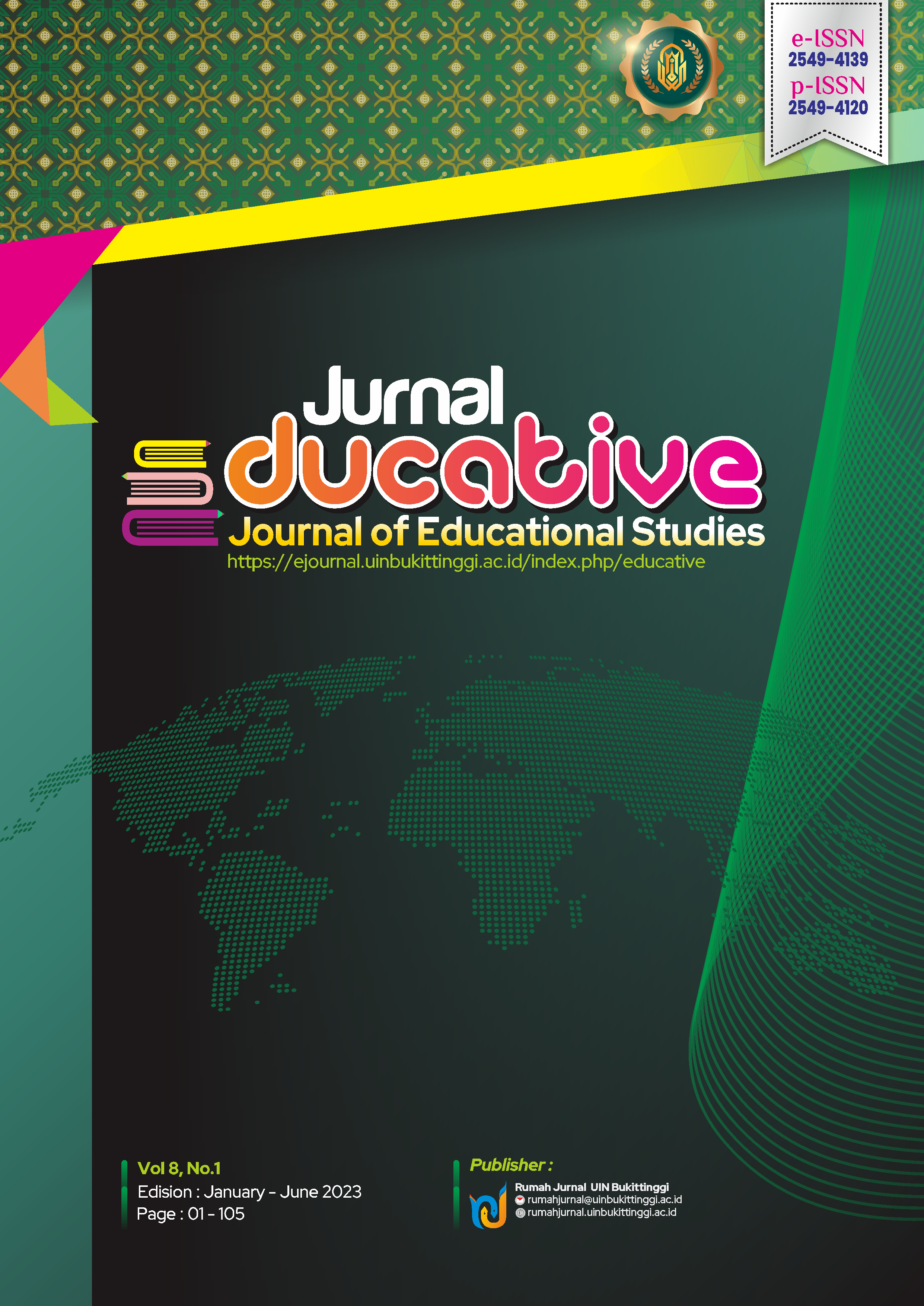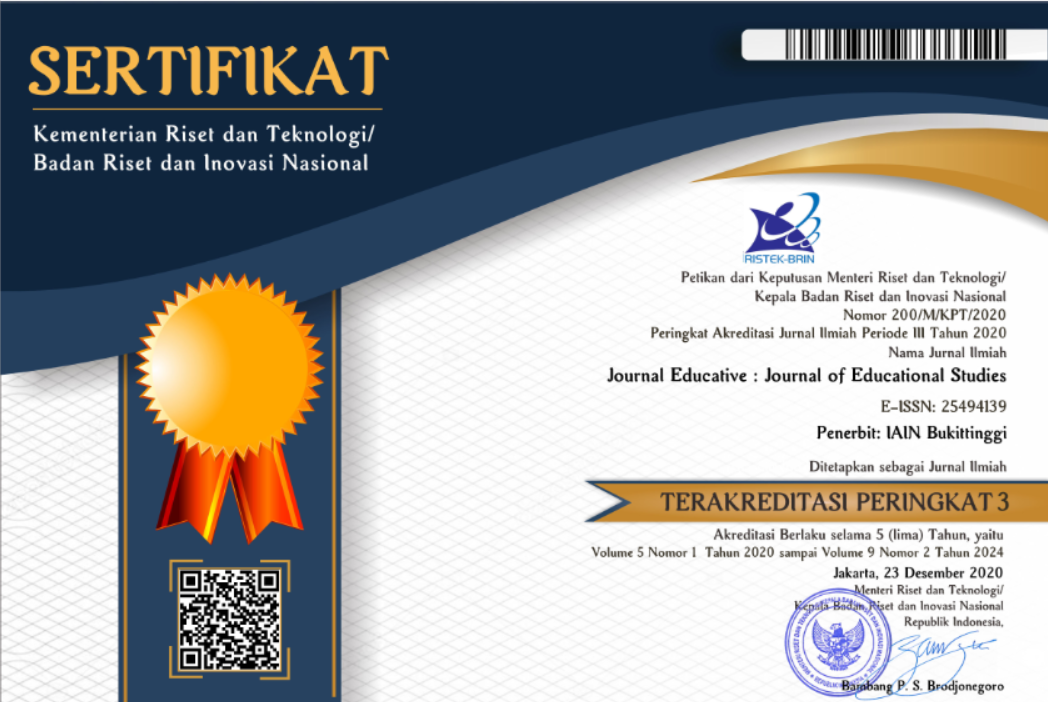CATUR EMPATI (CEMPA) : An Innovative Educational Game Approach to Enhance Empathy and Prevent Bullying
DOI:
https://doi.org/10.30983/educative.v10i1.9550Keywords:
Moral education, bullying behaviour, catur empati, game educationAbstract
Low empathy in students is a major factor significantly driving the emergence and continuation of bullying behavior in the school environment. This study aimed to measure the effectiveness of the empathy chess educational game (catur empati – Cempa ) in increasing empathy of elementary school students, analyzing the impact of Cempa on reducing physical and verbal bullying in the elementary school environment. This research employed a mixed methods approach with an explanatory sequential design. The data collection techniques included pretests-posttests, interviews, and questionnaires. The data analysis technique in this study used the N-Gain test from the pretest-posttest results and triangulation from the results of interviews and questionnaires. The results in this study show the effectiveness of the Cempa in increasing student empathy through pretest and posttest. The average N-Gain value on empathy knowledge and empathy attitudes is classified as a moderate category. Meanwhile, the average N-Gain value in the aspect of empathy action is classified as a low category. The impact of the educative game Cempa on physical and verbal bullying is also seen to have decreased bullying behavior. This is due to the level of empathy, knowledge, and attitudes of students who have increased after playing Cempa. So, it is proven that the Cempa can increase empathy to reduce bullying behavior
References
Ahmad Mahzumi, D. (2024). Kesesuaian Peran Guru Pada Strategi Resolusi Konflik Untuk Meningkatkan Empati Dan Keterampilan Sosial Siswa Di Sekolah Dasar. Pendas: Jurnal Ilmiah Pendidikan Dasar, 09, 355–367.
Andriati, N., Atika, A., & Yuditio, P. R. (2019). Meningkatkan Sikap Empati Siswa SMP melalui Layanan bimbingan kelompok dengan Teknik Sosiodrama. Edukasi: Jurnal Pendidikan, vol 17 No, 68–79.
Andriati Reny H, A. D. N. A. (2020). Hubungan Harga Diri Dan Pengetahuan Tentang Bullying Dengan Perilaku Bullying Pada Remaja. Jurnal Ilmiah Keperawatan Altruistik, 3(2), 28–37. https://doi.org/10.48079/vol3.iss2.57
Asyifah, C., Firmansyah, M. A., & Budiman, D. A. (2024). Kasus Bullying Dunia Pendidikan di Indonesia dari Perspektif Media dan Pemberitaannya. Syntax Literate ; Jurnal Ilmiah Indonesia, 9(1), 374–383. https://doi.org/10.36418/syntax-literate.v9i1.14855
Azhari, D. S., Afif, Z., Kustati, M., & Sepriyanti, N. (2023). Penelitian Mixed Method Research untuk Disertasi. INNOVATIVE: Journal Social Science Research, 3(2), 8010–8025.
Azmi, I. U., Nafi’ah, N., Thamrin, M., & Akhwani, A. (2021). Studi Komparasi Kepercayaan Diri (Self Confidance) Siswa yang Mengalami Verbal Bullying dan Yang Tidak Mengalami Verbal Bullying di Sekolah Dasar. Jurnal Basicedu, 5(5), 3551–3558. https://doi.org/10.31004/basicedu.v5i5.1389
Diswantika, N., & Yustiana, Y. R. (2022). Model Bimbingan Dan Konseling Bermain Cognitive-Behavior Play Therapy Untuk Mengembangkan Empati Mahasiswa. Jurnal Mahasiswa BK An-Nur : Berbeda, Bermakna, Mulia, 8(1), 40. https://doi.org/10.31602/jmbkan.v8i1.6215
Doly Nasution, M., Ramadhan, R., Kunci, K., & Pemecahan Masalah, K. (2023). Pengaruh Model Pembelajaran Problem Solving Terhadap Kemampuan Pemecahan Masalah Siswa Kelas VIII SMPIT Miftahul Jannah. Journal Of Social Science Research, 3, 260–268.
Hakim Nasution, F., Syahran Jailani, M., & Junaidi, R. (2024). Kombinasi (Mixed-Methods) Dalam Praktis Penelitian Ilmiah. Journal Genta Mulia, 15(2), 251–256. https://ejournal.stkipbbm.ac.id/index.php/gm
Harianja, S. I., & Nurihsan, A. J. (2016). Pendidikan sebagai Perjalanan Spiritual. Jurnal Kependidikan, 2(1), 59–71.
Hidayati, N. A., Waluyo, H. J., Winarni, R., & Suyitno. (2020). Exploring the implementation of local wisdom-based character education among indonesian higher education students. International Journal of Instruction, 13(2), 179–198. https://doi.org/10.29333/iji.2020.13213a
Hopeman, T. A., Suarni, K., & Lasmawan, W. (2020). Dampak Bullying Terhadap Sikap Sosial Anak Sekolah Dasar (Studi Kasus Di Sekolah Tunas Bangsa Kodya Denpasar). PENDASI: Jurnal Pendidikan Dasar Indonesia, 4(1), 52–63. www.kpai.go.id/profil
Inayah A.M, M., Lolotandung, R., & Irmawati M. (2023). Pengaruh Model Pembelajaran PAKEM Terhadap Hasil Belajar IPA Siswa Di Sekolah Dasar. Elementary Journal : Jurnal Pendidikan Guru Sekolah Dasar, 6(1), 29–38. https://doi.org/10.47178/elementary.v6i1.2056
Karisma, N., Rofiah, A., Afifah, S. N., & Manik, Y. M. (2024). Kesehatan Mental Remaja dan Tren Bunuh Diri: Peran Masyarakat Mengatasi Kasus Bullying di Indonesia. Edu Cendikia: Jurnal Ilmiah Kependidikan, 3(03), 560–567. https://doi.org/10.47709/educendikia.v3i03.3439
Khisbiyah, Y., Lestari, S., Purwanto, A., & Hidayat, Y. (2021). Memupuk Sikap Empati Anak Melalui Permainan Tradisional Gobag Sodor, Sundaname dan Boy-Boyan. Society : Jurnal Pengabdian Dan Pemberdayaan Masyarakat, 2(1), 75–81. https://doi.org/10.37802/society.v2i1.180
Kurniawan, K., Rahmawati Nur Baeti, Anisa Nur Afifah, Elsa Rizky Oktafierna, & Lia Ustami. (2024). Games Sebagai Intervensi Pencegahan Bullying Pada Anak Usia 6-18 Tahun: Scoping Review. Jurnal Ilmiah Permasa :Jurnal Ilmiah STIKES Kendal, 14(1), 227–236. https://doi.org/https://doi.org/10.32583/pskm.v14i1.1544
Lestari, N. C., Hidayah, Y., & Zannah, F. (2023). Penerapan Metode Pembelajaran Permainan Edukatif Terhadap Hasil Belajar IPA di SDN 1 Sungai Miai 7 Banjarmasin. Journal on Education, 5(3), 7095–7103. https://doi.org/10.31004/joe.v5i3.1497
Limilia, P., & Prihandini, P. (2019). Penyuluhan Stop Bullying sebagai Pencegahan Perundungan Siswa di SD Negeri Sukakarya, Arcamanik - Bandung. ABDI MOESTOPO: Jurnal Pengabdian Pada Masyarakat, 2(01), 12–16. https://journal.moestopo.ac.id/index.php/abdimoestopo/article/view/690
Marhaely, S., Purwanto, A., Aini, R. N., Asyanti, S. D., Sarjan, W., & Paramita, P. (2024). Literatur Review: Model Edukasi Upaya Pencegahan Bullying Untuk Sekolah. 2024, 5(1), 826–834. https://doi.org/https://doi.org/10.31004/jkt.v5i1.25398
Mariskha, S. E., & Umaroh, S. K. (2019). Bermain Peran untuk Meningkatkan Empati pada Anak Usia Sekolah Dasar SD “X” di Samarinda (Experiential Method). Motiva: Jurnal Psikologi, 1(1), 1–9. http://ejurnal.untag-smd.ac.id/index.php/MV/article/view/4016/3853%0Ahttp://ejurnal.untag-smd.ac.id/index.php/MV/article/view/4016
Marwan, D. W. (2023). Peningkatan Pengetahuan Bahaya dan Dampak Bullying Kepada Remaja SMP Negeri 39 Pekanbaru. Jdistira, 3(2), 61–65. https://doi.org/10.58794/jdt.v3i2.534
Maulina, I., & Budiyono, A. (2021). Peran Keluarga Dalam Pengelolaan Emosi Anak Usia Golden Age Di Desa Gambarsari. Jurnal Mahasiswa BK An-Nur : Berbeda, Bermakna, Mulia, 7(1), 21. https://doi.org/10.31602/jmbkan.v7i1.3404
Meilita, I., Timur, L. S., & Asbari, M. (2023). Pendidikan Melalui Permainan : Membangun Kreativitas dan Inovasi pada Generasi Digital. 02(05), 68–72.
Muharammah, N. W., Setiyowati, A. J., & Flurentin, E. (2024). Pengembangan “Perasaan Kita” sebagai Upaya Internalisasi Empati pada Siswa SMP. Buletin Konseling Inovatif, 1(2), 64–73. https://doi.org/10.17977/um059v1i22021p64-73
Mulyawati, Y., Marini, A., & Nafiah, M. (2022). Pengaruh Empati Terhadap Perilaku Prososial Peserta Didik Sekolah Dasar. Scholaria: Jurnal Pendidikan Dan Kebudayaan, 12(2), 150–160. https://doi.org/10.24246/j.js.2022.v12.i2.p150-160
Murti, S., & Heryanto. (2020). Relevansi Prestasi Belajar Sebagai Prediktor Perilaku Empati Di SMA Negri 5 Samarinda. Jurnal Ilmiah Wahana Pendidikan, 6(3), 295–307. https://doi.org/10.5281/zenodo.3960163
Najah, N., Sumarwiyah, S., & Kuryanto, M. S. (2022). Verbal Bullying Siswa Sekolah Dasar dan pengaruhnya terhadap hasil belajar. Jurnal Educatio FKIP UNMA, 8(3), 1184–1191. https://doi.org/10.31949/educatio.v8i3.3060
Nugraheni, Y. T., & Firmansyah, A. (2021). Model Pengembangan Pendidikan Karakter di Pesantren Khalaf (Studi Kasus di Pondok Pesantren Modern Muhammadiyah Boarding School Yogyakarta). Quality, 9(1), 39. https://doi.org/10.21043/quality.v9i1.9887
Nur, M., Yasriuddin, Y., & Azijah, N. (2022). Identifikasi Perilaku Bullying Di Sekolah (Sebuah Upaya Preventif). Al-Madrasah: Jurnal Pendidikan Madrasah Ibtidaiyah, 6(3), 685. https://doi.org/10.35931/am.v6i3.1054
Nurdin, M. N., & Fakhri, N. (2020). Perbedaan Empati Kognitif Dan Empati Afektif Pada Remaja Laki-Laki Dan Perempuan. Jurnal Psikologi TALENTA, 2(2), 11. https://doi.org/10.26858/talenta.v2i2.13199
Oktaviany, D., & Ramadan, Z. H. (2023). Analisis Dampak Bullying Terhadap Psikologi Siswa Sekolah Dasar. Jurnal Educatio FKIP UNMA, 9(3), 1245–1251. https://doi.org/10.31949/educatio.v9i3.5400
Paputungan, E., & Paputungan, F. (2023). Pendekatan Dan Fungsi Affektif Dalam Proses Pembelajaran The Role And Function Of Affective Approaches In Learning. Media Online) Journal of Education and Culture (JEaC), 3(1), 2986–1012. https://doi.org/https://doi.org/10.47918/jeac.v3i1.1136
Pramono, A., Tama, T. J. L., & Waluyo, T. (2021). Analisis Arus Tiga Fasa Daya 197 Kva Dengan Menggunakan Metode Uji Normalitas Kolmogorov-Smirnov. Jurnal RESISTOR (Rekayasa Sistem Komputer), 4(2), 213–216. https://doi.org/10.31598/jurnalresistor.v4i2.696
Pratiwi, L., Nurhayati, T., Patimah, P., & Atikoh, N. (2020). The Effect of Independence Education in Islamic Boarding School on the Development of Emotional Intelligence of Elementary School Students. Al Ibtida: Jurnal Pendidikan Guru MI, 7(1), 85. https://doi.org/10.24235/al.ibtida.snj.v7i1.5147
Ramadhanti, R., & Hidayat, M. T. (2022). Strategi Guru dalam Mengatasi Perilaku Bullying Siswa di Sekolah Dasar. Jurnal Basicedu, 6(3), 4566–4573. https://doi.org/10.31004/basicedu.v6i3.2892
Sahana, Y., Wahyuni, S., Jannah, S. R., & Faiqotul, S. (2024). Permainan Ular Tangga Sebagai Media Pemahaman Bulyying Di Sekolah Menengah Pertama. Jurnal Review Pendidikan Dan Pengajaran, 7(2), 6187–6192. https://doi.org/https://doi.org/10.31004/jrpp.v7i2.28677
Samsudi, M. A., & Muhid, A. (2020). Efek Bullying Terhadap Proses Belajar Siswa. SCAFFOLDING: Jurnal Pendidikan Islam Dan Multikulturalisme, 2(02), 122–133. https://doi.org/10.37680/scaffolding.v2i02.466
Sapariah Anggraini, & Dewi, S. K. (2023). Edukasi remaja tentang pengenalan jenis perilaku bullying di sekolah melalui metode role plays. Transformasi: Jurnal Pengabdian Masyarakat, 19(1), 83–92. https://doi.org/10.20414/transformasi.v19i1.6880
Syafitri, S. M. (2020). Menumbuhkan Empati Dan Perilaku Prososial Terhadap Anak Usia Dini Dalam Menanggapi Pelajaran Isu Dunia Nyata. Jurnal Visi Ilmu Pendidikan, 12(2), 140. https://doi.org/10.26418/jvip.v12i2.34049
Syamsurrijal, A. (2020). Bermain Sambil Belajar: Permainan Tradisional Sebagai Media Penanaman Nilai Pendidikan Karakter. ZAHRA: Research and Tought Elementary School of Islam Journal, 1(2), 1–14. https://doi.org/10.37812/zahra.v1i2.116
Tuti Hidayati, E. B. (2022). Pengaruh Penggunaan Aplikasi Quizizz Sebagai Game Edukasi Untuk Meningkatkan Kemampuan Kognitif Anak Usia Dini Di TK Anak Bangsa. Al Abyadh, 5(1), 42–50.
Wicaksono, H., Hibatulloh, K. J., & Ningrum, P. (2021). Hubungan Penggunaan Sosial Media Dengan Perilaku Bullying Pada Remaja Di Smk Sepuluh November Sidoarjo. J-ABDI: Jurnal Pengabdian Kepada Masyarakat, 1(5), 813–824. https://doi.org/10.53625/jabdi.v1i5.381
Wulandari, H., & Ningsih, S. A. (2023). Penguatan Pendidikan Karakter Sejak Dini Untuk Melawan Aksi Bullying Era Revolusi 5.0. Innovative : Journal Of Socisl Sciece Research, 3(2), 14773–14787.
Downloads
Published
How to Cite
Issue
Section
Citation Check
License
Copyright (c) 2025 Shofa Fadhilah Hidayat, Mudiyah Nasiriyah, Endang Herawan, Iis Yeni Sugiarti

This work is licensed under a Creative Commons Attribution-ShareAlike 4.0 International License.
Authors who publish with this journal agree to the following terms:
1. Authors retain copyright and grant the journal right of first publication with the work simultaneously licensed under a Creative Commons Attribution License that allows others to share the work with an acknowledgment of the work's authorship and initial publication in this journal.
2. Authors are able to enter into separate, additional contractual arrangements for the non-exclusive distribution of the journal's published version of the work (e.g., post it to an institutional repository or publish it in a book), with an acknowledgment of its initial publication in this journal.
3. Authors are permitted and encouraged to post their work online (e.g., in institutional repositories or on their website) prior to and during the submission process, as it can lead to productive exchanges, as well as earlier and greater citation of published work (See The Effect of Open Access).




